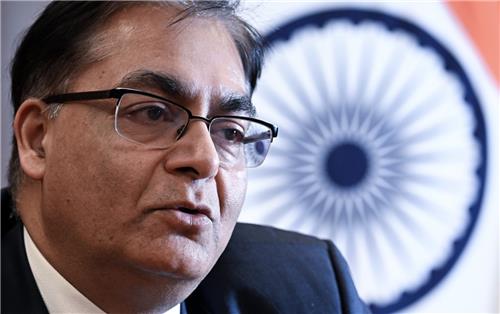(Yonhap Interview) India's top envoy says partnership with S. Korea mutually enhances economic, technological security

SEOUL, Aug. 18 (Yonhap) -- The deepening partnership between South Korea and India benefits both countries by strengthening their economic and technological security, with significant potential for collaboration in areas such as semiconductors and artificial intelligence, India's top envoy to Seoul has said.
Ambassador Amit Kumar made the remarks as he underscored the changing dynamics in the global security environment where the importance of aligning with partners for economic and technological resilience is gaining ground.
"The concept of security has expanded to encompass several facets, including economic and technology security ... Our experience has been that making digital architecture inclusive can bring about socio-economic transformation," Kumar said in a written interview with Yonhap News Agency on Wednesday.
"There are clearly many potential areas of cooperation that can be explored for mutual benefit. Our partnership can help advance our economic and technology security," Kumar said.
Kumar noted that his country and South Korea have been cooperating to create diversified and resilient supply chains, through such platforms as the multilateral Minerals Security Partnership, a U.S.-led forum on strengthening the sourcing of critical minerals, seen as mainly created to reduce dependence on China.
Kumar suggested that the partnership can further expand by leveraging the strengths of each country, like South Korea's edge in advanced manufacturing and technologies, and India's vast pool of skilled workers in semiconductor engineering.
"Advanced technology areas like semiconductors, biotechnology and life-sciences, AI and quantum computing, outer space, are all important areas for India and the ROK to work together," Kumar said.
The ROK stands for South Korea's official name, the Republic of Korea.
South Korea's such capacities, coupled with India's rapidly growing economy, which registered an 8.2 percent expansion in the last fiscal year, also open avenues for collaboration in construction, infrastructure and green energy, including secondary batteries and electric vehicles, he said.
"The overall business climate in India has significantly improved," Kumar said, citing the government focus on reducing regulatory barriers and measures like the Fast Track Mechanism to address specific concerns for Korean companies.
According to the embassy, South Korea's investment in India stood at around US$8 billion, accounting for less than 1 percent of total inflows in India.
"There is clearly a case for more ambitious South Korean investment into India. Korean businesses will find India a welcoming place to do business in," he said.
South Korea and India also "converge" in the approaches to the Indo-Pacific region, he said, adding that the prosperity and security of both countries depend on the region's stability.
"We need to evolve through dialogue a common rules-based order, to ensure access to global commons, to ensure fair and balanced trade and supply chain resilience," Kumar said.
In this vein, maritime security, like issues related to securing sea lines of communication, can be another area for South Korea to explore potential cooperation with India, a member of the Quad security framework, involving the U.S., Australia and Japan, he said.
Last year, South Korea and India marked the 50th anniversary of the establishment of diplomatic relations. Kumar assessed that the year brought the two countries closer with a boost in high-level exchanges, reflecting the ties elevated to the "special strategic partnership" in 2015.
President Yoon Suk Yeol met with Indian Prime Minister Narendra Modi twice last year alone. The foreign-ministerial dialogue resumed in March this year for the first time in six years.
Under this landscape, Kumar expressed hope to see more robust people-to-people exchanges taking place, as he regards it as "exceedingly crucial" in building a "resilient" partnership.
"We need to inject more momentum in these exchanges ... They constitute a vital bridge to promote greater awareness and friendship among our peoples," Kumar said.
"These numbers will continue to grow, I believe, as our bilateral engagement on economic, commercial and technology front grows," he added.
elly@yna.co.kr
(END)





